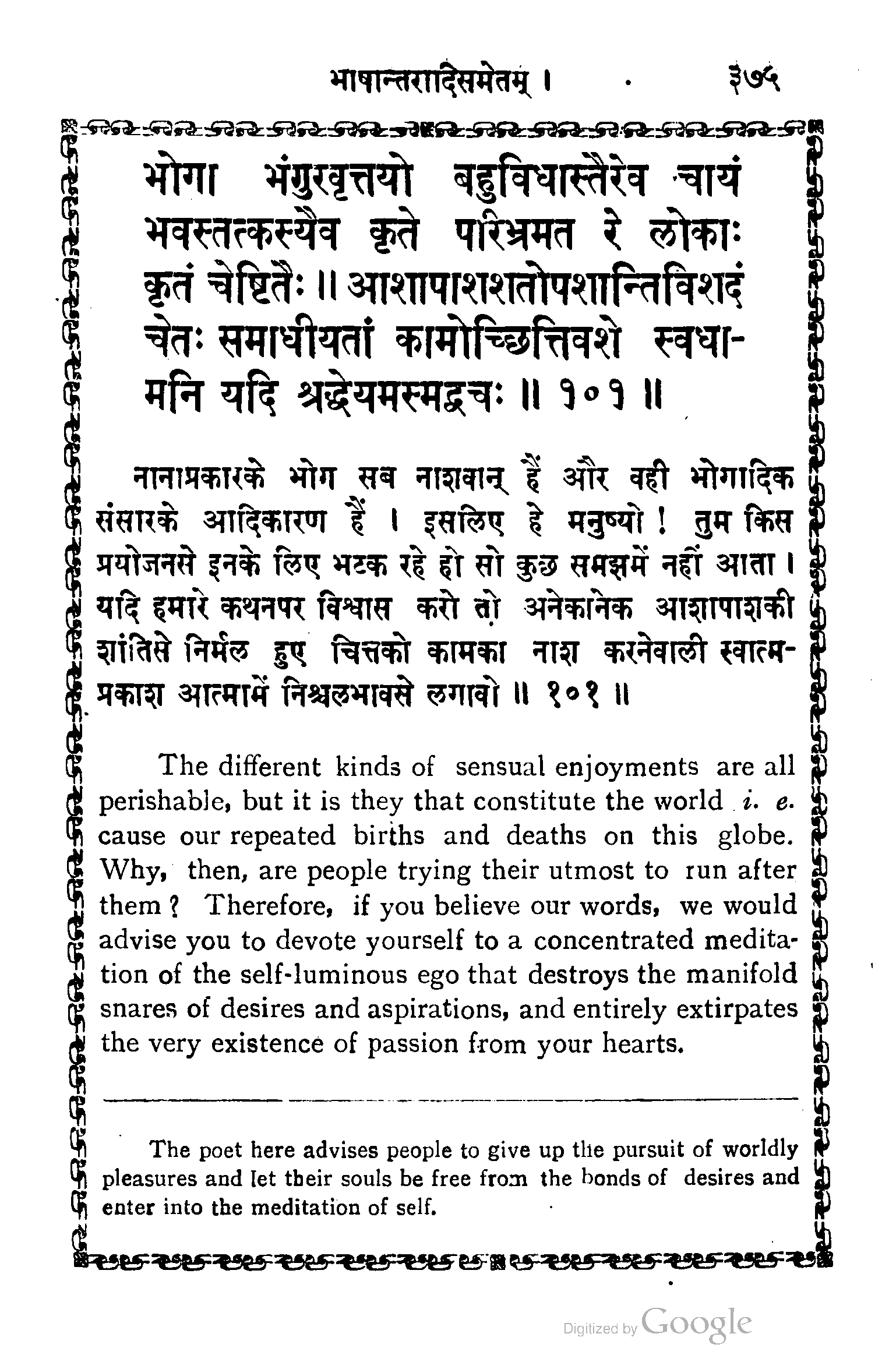Tawney
Mādhavānanda
Telang
verse

Text (not proofread)
भोगा भङ्गुरवृत्तपो बहुविधास्तैरेव न्वायं भव
स्तत्कस्यैव कृते परिभ्रमत रे लोकाः कृतं चेष्टितैः ।
आशापाशशतोपशान्तिविशदं चेतः समाधीयतां
कामोच्छित्तिवशे स्वधामनि यदि श्रद्धेयमस्मद्वचः ॥ १०२ ।
footnote

Text (not proofread)
CII . ( b ) ° स्यैव ; ° स्येह . A. T. R. P.N. Bo . G. M. K. ० मत ; ॰म
थ . A. Bo.n. रे ; हे . T. K. G. ° तं चे ° ° तैवे ° A. ° ष्टितैः ; ° ष्ठितम् . T. K. G.
Bo . ( orig . Bo.n. ) ( d ) ° मो ° ° भ्यो ° Bo . ( orig . Bo.n. ) G. ° छि ०
ogo . T. K. N. Bo . G. ° शेख ; शाख . N. ० शख ° Bon . श्र ° ; ल ० .
Bo.n. ( orig . Bo.n. ) ,
endnote

Text (not proofread)
St. CII. : = and this world is constituted of them
only . In , ¶¶ if taken ( since the ordinary sense is not
appropriate ) would require . ( Siddh . Kaum . I. , 47 )
hence must be held to be better . a which it will be
seen is the reading of all except only two of the MSS . is the
imperative . The construction is common as in fa : KÜJ in
the Uttararâmacharita p . 127 and elsewhere . The translation
would be " why should you wander " instead of " why do you
wander " involves a clash of figures disapproved of in
English Rhetoric but see Kavyâdars'a p . 149 ( II . , 93 ) . Hilfestel
स्वधामनि = स्वकीये शरीरमन्दिरे कामोच्छित्तिवशे कन्दर्पजयार्थम् ( commentary )
F¶qñquda orâà expað çêû çaluatulÃ¶Ê : ( Râmarshi . ) Rightly ;
only स्वभामन् means भान्मतेजस् . - S ' drdalavikridita ,
Kosambi
verse

Text (not proofread)
भोगा भङ्गुरवृत्तयो बहुविधासू तैरेव चायं भवस्
तत् कस्यैव कृते परिभ्रमत रे लोकाः कृतं चेष्टितैः ।
आशापाशशतोपशान्तिविशदं चेतः समाधीयतां
कामोच्छित्तिवशे स्वधामनि यदि श्रद्धेयमस्मद्वचः ॥ २ ९ २ ॥
footnote

Text (not proofread)
292 { V } Om . in F1 NS1.2 , and BU114 / 7 . " ) F2 बहुविधैस् ; Wat.at
[ 5 पि ] बहुधा ( for बहुविधास् ) . Ba lacuna from चायं up to शतोप in third pāda .
W3 -विधस् ; X G2 . 3 भवो ; Y + -6 भ्रमस् ; M. 1 हतस् ; Ms हितः . F In Ms , the whole
second păda is missing 1 and third päda is given twice . 4 ) B1 CD F5 H I J2.3
Wat X Y1 . 2.8 T G4.5 तत्कस्येह ; Es Ji Mi तत्कस्येव ; F2 सक्तस्येह ; F3 तस्यैवेह ; · W1c . 2.30 , 40
तत्कस्मै ह ; Wat तत्कस्मै हि ; Y + -6 सत्तस्यैव ; G2.3 यत्तत्कस्य ; G1 Me चक्रस्येव ( for तत् कस्यैव ) .
F2 परिभ्रमलते ; W1.2.3c X Y1.2 G2-4 परिभ्रमत हे ; Wat परिमज हे ; Ga परिभ्रमतटे ; M1
परिभ्रमथरे ; M2 परिभ्रमतदे ; M + वरभ्रततरो ( for परिभ्रमत रे ) . F2 T3 M. 4 लोकः ; F3 J1
लोका ; Y : G1 M2.3 लोकै :. 31 सुखं तिष्ठत ; W1-3 X Y7 G1 . 3. 4tv . M2.3 कृतं चेष्टितं .
c ) Y1 -हतोप J ' शांतविश ( J1 ष ) दं ; W3 शांतिविषदं ; Yr Ma ( second time )
' शांतिविवशं ; Ms ( first time ) शांतिविवरं . Y : समाधीयते . d ) A कामोच्छित्तिविधौ ; C
तापोच्छित्तिवशे ; D F3 Ie J W ‡ t Y2 ( orig . ) .5.6 G1.3 M1.2.4 कामोन्पत्तिवशे ; Fa
कामापत्तिवशे ; F5 Y1 Mo कामोत्पत्तिवशं ; W1.2.3t.te G + काम्योत्पत्तिवशे ; W3e कामोत्प
त्तिवशी ; F X काम्योत्पत्तिविश ; Y : ( by corr . ) . 3 G2 कामोत्पत्त्यवशे ( Y3 ( श - ) ; Y4.7.8 TG5
कामोत्पत्तिवशात् ; M3 गम्योत्पत्ति * * . Fs F3 स्वधाम्नि च यदि ; X स्वधामनियतं . G + अस्मद्वशः .
B क्वाप्यात्यंतिकसौख्यधामनि यदि श्रद्धेयमस्मद्वचः .
BIS . 4632 ( 2071 ) Bhartṛ . ed . Bohl . 3. 40. Haeb . and Galan 36. lith . ed . I.
37 , II . 90 ; SRK . p . 93. 8 ( Bh . ) ; SSD . 4. f . 18a .

